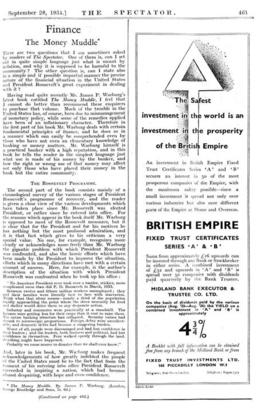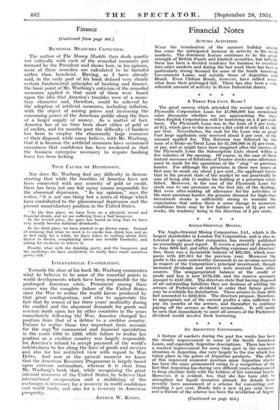Finance
The Money Middle*
There are two questions that I am sometimes asked by readers of The Spectator. One of them is, can I set out in quite simple language just what is meant by inflation,. and why it is supposed to be harmful to the comnnuiity? The other question is, can I state also in a simple and if possible impartial manner the precise nature', of the financial situation in the United States and President Roosevelt's great experiment in dealing with ft? - Having read quite recently Mr. James P. Warburg's latest book entitled The Money Muddle, I feel that I. cannot do better than reconunend these enquirers to purchase that volume. Much of the trouble in the United States has, of course, been due to mismanagement of monetary policy, while some of the remedies applied have been of an inflationary character. Therefore in the first part of his book Mr. Warburg deals with certain fundamental principles of finance, and he does so in a manner which can easily be. comprehended even by those who have not even an elementary knowledge of banking or money matters. Mr. Warburg himself is a practical banker with a high reputation, and in this book he tells the reader in the simplest language just what use is made of his money by the banker, and how the right or wrong use of that money may affect not only those who have placed their money in the bank but the entire community.
THE ROOSEVELT PROGRAMME.
The second part of the book consists mainly of a chronological survey of the various stages of President Roosevelt's programme of recovery, and the reader is given a close view of the various developments which have taken place since Mr. Roosevelt was elected President, or rather since he entered into office. For the reasons which appear in the book itself Mr. Warburg is opposed to most of the Roosevelt measures, but it is clear that for the President and for his motives he has nothing but the most profound admiration, and it is that fact which gives to his criticism a very special value. No one, for example, recognizes more clearly or acknowledges more freely than Mr. Warburg the gigantic problem with which President Roosevelt was confronted, and also the heroic efforts which have been made by the President to improve the situation, efforts which in many directions have met with a certain amount of success. Here, for example, is the author's description of the situation with which President Roosevelt was confronted when he took up his office :
" No. American President ever took over a nastier, stickier, more complicated mess than did F. D. Roosevelt in March, 1933.
Between twelve and fifteen million workers unemployed • they and their families were literally face to face with starvation. Think what that alone means—nearly a third of the population rapidly appwaching the. point where the sheer necessity for food and shelter would drive them to any desperate action.
Industry and commerce were practically at a standstill. The farmers were getting less for their crops than it cost to raise them. The entire banking structure had collapsed. Security values had tluunk to microscopic proportions. Foreign debts were uncollect- able, and domestic debts had become a staggering burden.
Worst of all, people were discouraged and haddost confidence in their leaders ; and the leaders, both business and political, had lost confidende in themselves. Fear walked openly through the land. Anything might have happened.
Probably we came nearer to disaster than we shall ever know."
And, later in his book, Mr. Warburg makes frequent acknowledgements of how greatly indebted the people of the United States must be to the fact that from the moment of his entering into office President Roosevelt succeeded in inspiring a nation, which had become almost despairing, with hope and even confidence.
* The Money Muddle. By James P. Warburg. (London, George Routledge and Sons, is. 6d.) (Continued on page 462.)
Finance
(Continued from page 461.)
REMEDIAL MEASURES CRITICIZED.
The author of The Money Muddle then deals quietly but critically with each of the remedial measures put forward by the President and shows how, in his opinion, most of these remedies are .calculated to be harmful rather than beneficial. Having as I have already said, in the early part of his book defined very clearly certain fundamental principles of banking and finance, the basic point of Mr. Warburg's criticism of the remedial measures applied is that most of them were based upon the idea that America's troubles were of a mone- tary character and, therefore, could be relieved by the adoption of artificial measures, including inflation, with the object of raising prices and increasing the consuming power of the American public along the lines of a larger supply of money. As a matter of fact, America has at no time been short either of gold or of credits, and for months past the difficulty cf bankers has been to employ the abnormally large resources at their disposal, while many believe, with Mr. Warburg, that it is because the artificial measures have occasioned uneasiness that confidence has been weakened so that the business enterprise necessary to require banking loans has been lacking.
TRUE CAUSES OF DEPRESSION.
Nor does Mr. Warburg find any difficulty in demon- strating that while the troubles of America have not been connected with any scarcity of gold or credit, there has been not one but many causes responsible for the abnormal depression. " In my opinion," says the writer, "it is not one thing but a series of things which have contributed to the phenomenal depression and the present unsatisfactory position in the United States.
" In the first place, we have been on a physical, moral and financial drunk, and we are suffering from a bad hangover.
In the second place, the spree has lasted so long that we have very nearly become habitual drunkards.
In the third place, we have started to go doctor crazy. Instead of realizing that what we need is to smoke less, drink less, and go to bed early for a while, we have taken to rushing about from doctor to doctor, complaining about our terrible headache, and asking for medicine to relieve it.
Finally, what with the drinking party, and the hangover, and the medicines we have swallowed, we really have made ourselves pretty sick."
INTERNATIONAL CO-OPERATION.
Towards the close of his book Mr. Warburg enumerates what he believes to be some of the essential points in world developments which have been responsible for the prolonged American crisis. Prominent among these causes was the complete failure of the United States since the War to realize the world havoc produced by that great conflagration, and also to appreciate the fact that by reason of her three years' neutrality during the conflict and the abnormal demands for goods and services made upon her by other countries in the years immediately following the War, America changed her position from that of a debtor to a creditor country. Failure to realize those two important facts account for the orgy 'of commercial and financial speculation in the years 1926 to 1929, while failure to realize her position as a creditor country was largely responsible for America's refusal. _ accept payment of the world's indebtedness to her aong the lines of goods and services and also for her restricted view with regard to War Debts. And now at the present moment we know that the American Recovery Programme is largely based upon extreme nationalism, whereas it is clear from Mr. Warburg's book that, while recognizing the great internal resources of the United States, he believes that international co-operation and a stabilizing of the exchanges is necessary for a recovery in world confidence and world trade, and also for a recovery in American prosperity.
_ ARTHUR W. KIDDY. .



















































 Previous page
Previous page